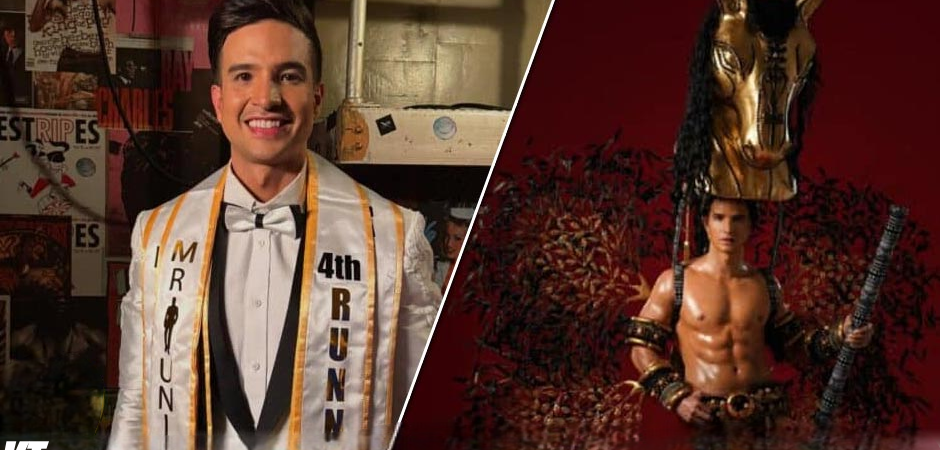Markki Stroem, the 4th runner-up of Mister Universe 2024, issued an apology on December 23 after mistakenly referring to the Philippines as the “Land of the Rising Sun” during his introduction at the competition held in California on December 22.

In his introduction, Stroem intended to call the Philippines the “Pearl of the Orient Seas,” a popular moniker for the country. However, in a slip of the tongue, he referred to it by the title associated with Japan, which is known as the “Land of the Rising Sun.”
Taking to Instagram to address the mistake, Stroem explained, “Happy to have represented the ‘Pearl of the Orient,’ the Philippines! I am so deeply sorry, I guess, sometimes nerves take over.” His apology was well-received, as fans and followers acknowledged the pressure of the high-stakes competition.
Aside from being named 4th runner-up, Stroem also took home two special awards: Best in Talent and Best in National Costume. His national costume, designed by Patrick Isorena and inspired by the mythical Tikbalang, was a standout at the event. Isorena was assisted in the concept by “Eat Bulaga” host Paolo Ballesteros.
The Mister Universe 2024 competition took place at Avalon Hollywood in Los Angeles, California, where Stroem impressed the judges and audience with his performances, as well as his representation of Filipino culture.
The recent Mister Universe 2024 pageant was a night to remember, with contestants from all over the world vying for the top spot. However, one contestant’s mistake has left many Filipinos feeling disappointed and embarrassed. Markki Stroem, the Philippine representative to the pageant, apologized for mistaking the Philippines as the “Land of the Rising Sun” during the question and answer portion of the competition.
The mistake was made when Stroem was asked to introduce himself and his country. Instead of proudly declaring the Philippines as his homeland, he referred to it as the “Land of the Rising Sun”, which is actually the nickname of Japan. The audience was left in shock, and many Filipinos who were watching the pageant were left feeling embarrassed and disappointed. Stroem’s mistake was quickly picked up by social media, with many netizens expressing their disappointment and frustration over the error.
Stroem was quick to apologize for his mistake, taking to social media to express his regret and embarrassment. He explained that he was nervous and overwhelmed during the competition, and that his mistake was not intentional. He also assured his fans and fellow Filipinos that he is proud to be representing the Philippines and that he will do his best to make the country proud. Despite his apology, many Filipinos are still feeling disappointed and frustrated over Stroem’s mistake.
The mistake has also sparked a debate over the importance of knowing one’s country’s history and culture. Many netizens have expressed their concern that Stroem’s mistake is a reflection of a larger problem in the Philippines, where many young people are not taught about their country’s history and culture in school. Others have argued that Stroem’s mistake is simply a result of nerves and pressure, and that he should not be judged too harshly.
The incident has also raised questions about the selection process for the Philippine representative to the Mister Universe pageant. Many have wondered how Stroem was chosen to represent the country, despite his apparent lack of knowledge about the Philippines’ history and culture. Others have argued that the selection process is fair and that Stroem was chosen based on his physical appearance and charisma.
Despite the controversy, Stroem remains committed to representing the Philippines in the best possible way. He has promised to work harder to learn more about the country’s history and culture, and to make the Philippines proud in future competitions. His apology has also been accepted by many Filipinos, who appreciate his humility and willingness to learn from his mistake.
The incident has also sparked a renewed sense of patriotism and pride among Filipinos. Many have taken to social media to express their love and pride for the Philippines, and to share their knowledge of the country’s history and culture. Others have called for greater emphasis on teaching Philippine history and culture in schools, to prevent similar mistakes from happening in the future.
In the end, Stroem’s mistake has served as a reminder of the importance of knowing one’s country’s history and culture. It has also sparked a renewed sense of patriotism and pride among Filipinos, and has encouraged many to learn more about the Philippines’ rich and diverse heritage. While Stroem’s mistake was embarrassing and disappointing, it has also provided an opportunity for growth and learning, both for him and for the country as a whole.
The Mister Universe 2024 pageant has also highlighted the importance of cultural sensitivity and awareness. The competition has brought together contestants from all over the world, each with their own unique culture and heritage. The incident has served as a reminder of the importance of respecting and appreciating these differences, and of being mindful of the cultural nuances that can often be lost in translation.
As the dust settles on the controversy, Stroem remains committed to representing the Philippines with pride and dignity. He has learned a valuable lesson about the importance of knowing one’s country’s history and culture, and has promised to work harder to make the Philippines proud in future competitions. The incident has also sparked a renewed sense of patriotism and pride among Filipinos, and has encouraged many to learn more about the Philippines’ rich and diverse heritage.
In conclusion, Stroem’s mistake has served as a reminder of the importance of knowing one’s country’s history and culture. It has also sparked a renewed sense of patriotism and pride among Filipinos, and has encouraged many to learn more about the Philippines’ rich and diverse heritage. While the incident was embarrassing and disappointing, it has also provided an opportunity for growth and learning, both for Stroem and for the country as a whole.



